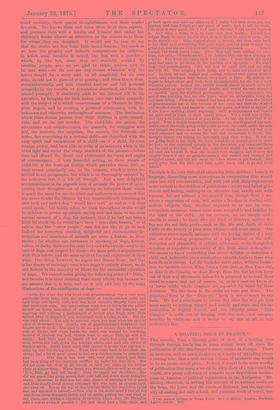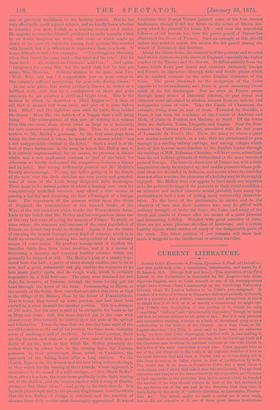A BOATING TOUR IN FRANCE.*
THE novelty, from a literary point of view, of a boating tour through foreign lands has to some extent worn off since the publication of Mr. MacGregor's canoe cruises in Europe. There is, however, still so much freshness as a mode of travelling about a rowing tour, that a well-written volume of moderate size would be by no means out of place. Indeed, it would be far more worthy of publication than many a would-be witty diary of a trip roundthe world, or a prosy collection of remarks upon Republican institu- tions in America or political organisation in the Antipodes. Mr.. Molloy, therefore, in writing this account of an autumn cruise on the Seine, the Loire, and the canals of Brittany, had the opportu- nity of making not only a fresh and pleasant work of travel, but
* Our Autumn Holiday on French Risers. By J. C. Molloy. London: Bradbury, Agnew, and Co. 1874.
one of practical usefulness to the healthy tourist. But he has very effectually spoilt a good subject, and we hardly know whether to consider him most foolish as a boating tourist or a writer. He appears to consider himself privileged to make remarks which he no doubt imagines are witty, and some of which might go down at an open-air luncheon among four persons like-minded with himself, but it is ridiculous to reproduce them in a book. It is not difficult to cull a few examples. " Two things are charming when they travel the same road,—the wind and the tide ! But let them meet.' "Ah, scullern and blistern ! ' said Cox ! " And again, " Imogene's the young flirt, but the maid calls her by her pet name, Miss Blossom. Delicate allusion to the nose,' said Two. 4 Well, Bow, old man ! I congratulate you on your conquest. She certainly suffered martyrdom for your sake during dinner.' " In the next place, this writer evidently fancies he writes in a brilliant style, and that by a combination of short and jerky sentences he can produce a vivid and bright book. This is the fashion in which he describes a blind beggar :—" A face so old that it seemed half worn away, and part of it gone before him. Blind ! and the sightless eyes sank far back, deep behind the bones. More like the shadow of a beggar than a still living being." The consequence of this sort of writing is a volume from this one cause alone about twice as large as is necessary, for each sentence occupies a single line. Then we may call at- tention to Mr. Molloy's grammar. In the very same page from which the last extract is taken, he speaks of a dinner which "was a not unappreciable contrast to the hotel." Such a word is at the best of times barbarous ; in the sense in which Mr. Molloy uses it, it is entirely ungrammatical, for he means, we presume, a dinner which was a not unpleasant contrast to that of the hotel, for otherwise we hardly understand the comparison between a dinner and an hotel. But having sufficiently pointed out Mr. Molloy's literary shortcomings. We may say, before going on to the details of the tour, that the little sketches are very pretty and graceful, some of those of the Loire being delightful little landscapes. There seem to be several points in which a boating tour, even for comparatively unskilled oarsmen, may afford a true means of passing a holiday and obtaining the best advantages of a foreign tour. The experience of the present writer upon the rivers of England, the remembrance of the wooded banks of the Wye, of the rich meadows which border the Warwickshire Avon, leads to the belief that Mr. Molloy and his companions chose one of the very best ways of seeing the scenery of France. To study, to some extent, the manners and customs of the rural population of France, no better way could be devised. Again, it has the charm of carrying the tourist through every kind of scenery, which is in itself an advantage, and making him independent of the ordinary means of conveyance. By prudent management it renders the traveller fairly free from hotel troubles, and it is a means of traversing a country and enjoying healthy exercise which can generally be stopped at will. Mr. Molloy's plan of a cranky four- oared boat was bad ; a party of three always enables one to be at rest, and a good, substantial oak gig enables the voyagers to go into many pretty spots, and do rough work, which is certainly impossible in a frail four-oar. The party were detained for two days, for instance, at Orleans, through the horse having put his head through the bows of the boat. Commencing at Havre, at the mouth of the Seine, these travellers ascended this river as high as the village of St. Mames, close by the forest of Fontainebleau. That is to say, they rowed up some portion, and had their boat -carried in a river steamer for another portion. This is a distance of 283 miles, but the river is said to be navigable for boats as far as Mery-sur-Seine ; still, this must depend (as is the case with almost every river towards its source) upon the state of the springs and tributaries. From the time that the traveller loses sight of the sea till be arrives at the end of his journey, the Seine is one changing scene of landscapes and of incident. In the lower portion, there are the breadth and rush of a great river, mixed with little inci- dents of sea life, such as that which Mr. Molloy gracefully de- scribes when he relates how, in the evening light, the Norman peasants, in their picturesque dress, await, at Caudebec, the approach of the fishing-boats after a long absence. To the church, Barre-y-va, the women and old men bring votive offerings, as they watch for the coming of their friends, whose approach is announced by the sound of a wild cantique,—"Ave, Maris Stella!" then, after a few bars, the boats loom gradually in the light, coming out of the shadow, and the women answer with a song of thanks- giving—" Dei Mater Alma !"—and go up to the little church. It is by such picturesque and, to the prosaic Englishman, novel incidents that the true feeling of change is obtained, and the reaction of absence from daily routine most thoroughly appreciated. It was at
Caudebec that Joseph Vernet painted some of his best marine landscapes, though it did not figure in the series of fifteen sea- ports which he painted for Louis XV. ; and even the superficial follower of art knows, too, how the poetic pencil of Turner has illustrated the rivers of France. Such an example as this should induce any artist to search for scenes for his pencil among the waters of Normandy and Brittany.
Along the Haute Seine, the country is of the pastoral and wooded kind which characterises the rivers of England, especially the higher reaches of the Thames and the Severn. It differs entirely from the Loire, which flows past towns and châteaux eminently foreign and French in character, through wide and fertile plains which are in marked contrast to the more English character of the Seine. The great drawback to the navigation of the Loire appears to be its sandbanks, and there is great monotony about much of its flat landscapes. But no river in France passes through more scenes of historical interest, or past towns and châteaux more calculated to awaken interest from an artistic and antiquarian point of view. Take the Castle of Chaumont, for example, rising from its nest of trees. Founded by Gueldin, a Dane, it has been the residence of the Counts of Amboise and Blois, of Diane de Poitiers and Madame de Stael. Of the towns there are Amboise, Tours, Langeais, and Angers. Near the first- named is the Château Cloux Luci, associated with the last years of Leonardo da Vinci's life. There are many to whom a quiet row amidst scenery which, as a rule, they are accustomed to pass through in a rattling railway carriage, and among villages which have of late become more familiar to the English reader through the writings of MM. Erkmann-Chatrian, will have more attractions than the set holiday-grounds of Switzerland or the more travelled parts of Europe. The historic characters of France can with a little imagination easily be conjured up, and amidst peasants whose poli- tical ideas are shrouded in darkness, and scenes where the traveller does not often venture, the pleasures of a holiday may be thoroughly enjoyed. Mr. Molloy does not appear to have made any inquiries as to the political feelings of the peasants or their social condition ; an accurate and skilled observer would probably have many op- portunities in such a tour of noting many noteworthy character- istics. To the lover of the picturesque in nature and to the observer of men and their manners who may be gifted with ordinary strength of body, the Seine, the Loire, and many of the rivers and canals of France offer the means of a most pleasant and interesting holiday. Mingled with great mistakes of taste, there are yet some pleasant sketches of landscape, and a certain healthy vigour which carries off many of the disagreeable parts of the work. The latter portion of our remarks will show how much it suggests to the intellectual or artistic traveller.







































 Previous page
Previous page